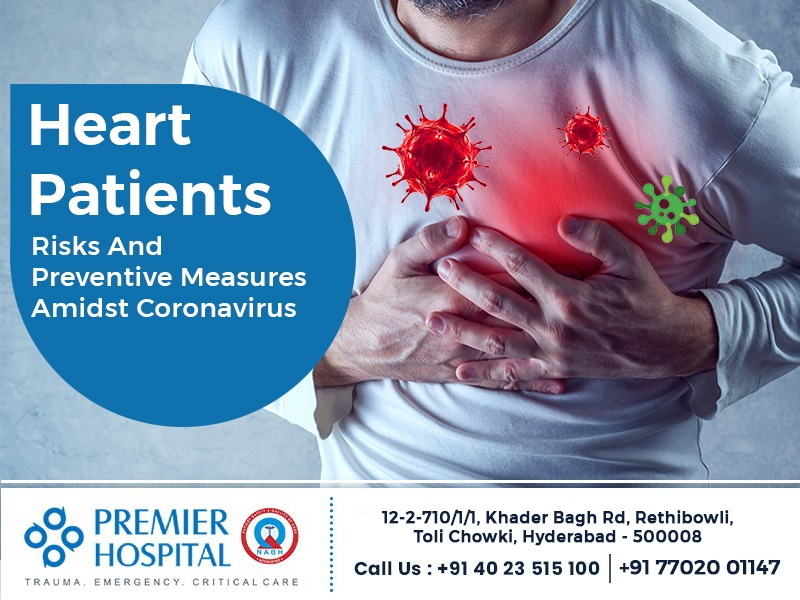COVID-19 & Heart: Precautions
by Premier Hospitals | August 1, 2021 |
Hope you have consulted your doctor about the effect of COVID-19 on you if you have a heart condition. If you haven't met your doctor yet, you should do it right away and ask him about those extra precautions you need to take. Coronavirus is commonly thought to be a respiratory illness that mostly affects your lungs. But it can also cause severe damage to your heart and some other primary organs in your body. Those people with heart problems — especially those who suffer from severe heart conditions — are at high risk of complications if affected by COVI19, says the Centers for Disease Control and Prevention (CDC). People with severe heart problems should take every possible precaution to avoid contact with COVID-19. As the pandemic continues, people should maintain social distancing, avoid social activities, and focus on their health, says our chief cardiology expert at Premier Hospital. Who's most at risk? Anyone can be affected by Coronavirus. Different kinds of vaccines are available right now. Most people who are infected with this virus experience mild symptoms and may be able to recover fully at home. But those who are 65 & older and with certain health conditions associated with heart, lungs, etc., are at higher risk of complications from COVID-19. Heart disease refers to a variety of conditions related to the heart. Coronary artery disease is the common heart problem that prevents blood from flowing to the heart and eventually leads to a heart attack. According to the American Heart Association, people in their 60s and older who have coronary heart disease or high blood pressure are among those most at risk of developing severe symptoms from COVID-19. Some popular Heart Associations reportedly stated that people with coronary heart disease (CAD) or high blood pressure are at higher risk of developing serious symptoms from COVID-19, particularly in older people. People with CAD, stroke survivors, and patients with other heart diseases are also at increased risk of complications if infected with COVID-19. Some of those conditions include heart failure, heart attacks, cardiomyopathy, congenital heart defects, heart valve disorders, and atrial fibrillation (AFib). How Coronavirus affects your heart? The risk of complications from viral infections is higher for people with heart disease in general. For example, the flu virus can cause a heart attack, so vaccinations are advised to reduce the risk. Coronavirus damages the respiratory system and makes your heart work faster & harder to pump oxygen-rich blood to various organs in the body. Coronavirus often causes blood clots in the arteries of your heart. In addition, it can attack the heart muscle and make it weak. Heart disease patients might suffer from added stress that can worsen their symptoms and result in more severe complications. What precautions should I take if I have heart disease? People with cardiovascular problems should follow the same preventive measures as everyone else when it comes to COVID-19, which include:- Wear a mask always when you go out
- Sanitize your hands frequently
- Maintain social distance and avoid visiting crowded places
- Provide your family with a phone number where they can reach a medical team if suspected of having Corona symptoms
- Stock up on all the required medicines and medical equipment like thermometers, BP machines, etc.
- Observe for the symptoms of COVID-19 — fever above 100°C, respiratory problems, and cough.
- Watch out for danger signs and call for medical help — increased shortness of breath, chest pain, dizziness, and bluish lips.
- Take vaccination
- If you are not feeling well, make an online consultation with your doctor.
- For people with heart conditions, your doctor may recommend additional monitoring.
- If you are undergoing cardiac rehab, you should discuss with your doctor how to proceed. A virtual cardiac rehab is also a viable option.





